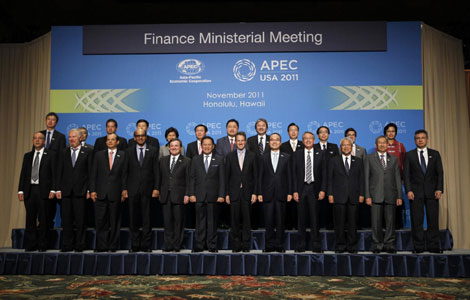How to deal with West's debt
Updated: 2011-11-04 08:06
By Klaus F. Zimmermann (China Daily)
|
|||||||||||
As Europe's economy remains on the brink, the idea of a "debt brake" is one of the most important policy tools to get fiscal policy under control. This debate is not just important for Europe, the United States and Japan, but also for the financial and economic health of emerging markets.
That's why a G20 declaration during the Nov 3-4 summit in Cannes to establish such debt brakes in national constitutions is critical. The establishment of such a measure would certainly stabilize the long-term expectations of governments' fiscal path in financial markets.
At its most basic level, a debt brake will force Western governments (including the US whose debt level will soon be enough to dominate international headlines again) to stop relying on "hope" as a core tool of public finance. In the far more optimistic 1970s, when the Western world had a feeling about itself as the emerging markets do today, Western governments still had reason to hope that they would grow fast enough to offset their rapidly rising levels of debt. Those hopes are gone, quite independent of the current economic calamity.
To be sure, an immediate imposition of the debt brake would be neither wise nor desirable, given the current economic conditions. But the time is certainly right for agreeing on the launch at a fixed date in the not-too-distant future. In Germany, for example, the debt brake, approved by parliament in 2010, will take force in 2016.
The recent European Union summit proscribed further obligations in this direction for the eurozone members. However, mere declarations of intent no longer suffice. The bet that politicians and citizens made with each other - that they would be rational enough to reduce their debt over time, even in the absence of any firm rules - has failed. That's why we now need to implement a reliable self-disciplining mechanism.
To be effective, such a debt brake mechanism must meet three tests: First, it must be anchored in countries' constitutions, underscoring the hard-to-revoke character of the commitment.
Second, countries must undertake commitments mutually, as is now the case in countries in the eurozone from Spain and Portugal to Italy.
And third, in light of the past failure of effective monitoring and enforcement (whether the Maastricht criteria in the EU or pay-go rules in the US), there must be independent watchdog agencies, equipped with penalizing powers in case of mal-performance.
But it is not just past practice that makes us in the West accountable for our past actions in running up debt. Our future-oriented self-interest dictates no less. Perhaps the most important number ever generated by the International Monetary Fund, an institution in the business of producing millions of numbers, is: 441 percent.
That is the expected debt-to-GDP ratio that the G7 countries will arrive at on average by 2050 under present policies, if we continue business as usual. Concerned as we rightly are about debt levels approaching 100 percent for major G7 nations (other than the eternal culprits of Japan and Italy both of which are way past that marker), some policymakers and policy analysts are still inclined to just wish that number away, believing in a magic healing function of the economy.
However, on the road to 441 percent, not even the most fantastical economic and political minds can really be prepared to go on with business-as-usual. The debt brake is a very useful instrument to achieve the turnaround.
The emerging market countries and their vast populations feel with good reason that this is their time, and that a shadow that laid over them for centuries has been lifted at long last. On most of these nations' minds, the past is closely associated with the legacy of colonialism. If the former colonial powers - read: today's G7 nations, plus some countries like Spain and Portugal - now don't get their fiscal acts together, there is a very real danger of a new form of colonialism.
That new "colonialism" would manifest itself in the very serious growth "tax" that would be imposed on the developing nations. That "tax" would take the form of a global economic collapse and a decline in development aid related to an unresolved Western debt overhang that may very soon prove unsustainable. Or it may take the form of high inflation, which would have the same effect on emerging market countries that depend on macroeconomic stability to execute their plan to move out from under the shackles of centuries-long underdevelopment.
All a debt brake says is this: First, we need to live within our means. And second, we need to understand that the pre-crisis spending levels were the maximum level of public spending and that any future needs or desires can essentially only be financed by cutting other, already funded activities by an identical amount.
Over the past several decades, it was usually emerging market countries that, in various waves of debt crises, were forced to learn to live within their means, often at the behest of their Western creditors. Now that situation has reversed. This time, it is the West that has to take the tough medicine.
The author is director of IZA (Institute for the Study of Labor), Bonn, Germany.
(China Daily 11/04/2011 page9)
Hot Topics
Libya conflict, Gaddafi, Oil spill, Palace Museum scandal, Inflation, Japan's new PM, Trapped miners, Mooncake tax, Weekly photos, Hurricane Irene
Editor's Picks

|

|

|

|

|

|







